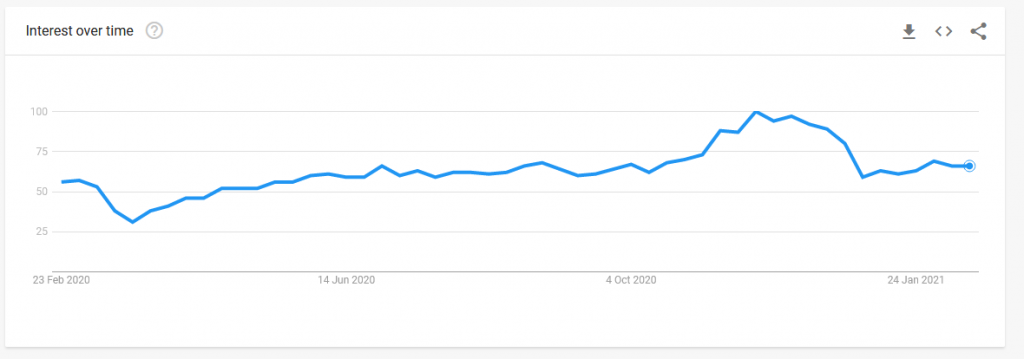The impact of the pandemic on precious metal prices may create opportunities in the UK for Indian jewellery manufacturers.
The UK jewellery sector has been hammered by the coronavirus pandemic, which has shuttered stores for months and eroded consumer confidence, but government supports have provided an essential lifeline.
Non-essential retail stores, including jewellers, are currently locked down for the third time, with the country reporting among the highest death rates in the world.
The digital transformation of jewellery retail has accelerated during the pandemic, with click-and-collect and online sales providing sustenance to jewellers who are adaptable to the latest e-commerce technologies.
The UK jewellery sector has received extensive government support during the crisis, such as furlough payments of 80% of salaries for employees, grants to the self-employed, and cheap loans for businesses.
UK hallmarking data is sharply lower, signalling a climate of falling demand, according to the latest Birmingham Assay Office figures, which showed hallmarked gold items down 4.7% year-on-year in December 2020; silver items down 17.7% year-on-year; platinum items down 24.8%; and palladium items, largely due to the surge in palladium prices, down 86.5%. In total, hallmarked precious metal items were down 12.1%.
Consumer confidence in the jewellery sector has also slipped.
Jewellery retailers across the UK whose members have been unable to meet in person since March 2020, have continued to meet weekly on zoom during lockdowns to share their knowledge, experience and expertise with one another.
“Tellingly, the mood has darkened somewhat in lockdown 3 with the members’ January confidence poll for the first time indicating that some (5%) of the members may not be reopening again,” said Michael Donaldson, a representative of the independent retailer community of the UK’s National Association of Jewellers (NAJ.)
“Others continue to worry how they will continue to meet their fixed running costs whilst closed, which for one member is 60% of their total costs. It will continue to be a very uncertain future for all retailers until a vaccinated public return to the high street.”
The following graph shows that Google search traffic for “jewellery” increased up to Christmas 2020 and then bottomed out in January 2021:
Google Trends Search Traffic For “jewellery” in the UK (Feb 2020 – Jan 2021)

With hopes rising that restrictions may be eased in the spring, industry consultant Helen Dimmick feels that jewellery sales may be less impacted in the UK than alternative luxury spending such as travel and eating out in restaurants.
“With the current routes to market limited to predominantly digital platforms, the performance of diamonds and coloured gemstones has plateaued during recent weeks,” she said.
“However, with the ‘light at the end of the tunnel’ as we face a gradual reopening of physical markets, I believe the celebratory relief and pent-up demand will underpin a strong performance for the jewellery sector going forward. Especially as we anticipate other high spend options such as travel will continue to be subject to further restrictions and controls.”
For UK-based jewellery wholesalers, new rules surrounding Value Added Tax (VAT) under Brexit, Britain’s recent departure from the EU, can boost trading opportunities, said Mehul Lodhiya, the GJEPC’s UK representative.
“The change in the new VAT rules is a boost to the industry as the importers are allowed to postpone their VAT payments,” Lodhiya told the Mines to Market website in February.
“Before, when we used to import, we had to pay the VAT upfront, but now you can pay VAT after you sell the goods and collect from the customer. You can also get your postponed import VAT statement online.
“This reduces the investment value in a big way as the VAT is 20%. Also, the import duty has been reduced to 2% from 2.5%.”
Lodhiya added, “The only setback UK jewellers will face will be less overseas buyers as the ‘tax-free’ status for overseas visitors is now abolished.”
A strengthening of the British pound since Brexit will enable importers to source jewellery made from dollar-denominated precious materials more cheaply.
However, there are concerns that the devastating impact of the pandemic on the UK economy may ultimately force the Bank of England to cut interest rates into negative territory for the first time in the UK’s history, potentially dragging on the currency.
The UK base rate is currently 0.1%, a historic low.
The latest surge in platinum prices to an almost 6-1/2-year peak may augur for a pickup in sales of imported Indian-manufactured gold jewellery in the UK engagement ring market.
Platinum engagement ring sales had benefited in recent years from platinum’s price discount to gold, but as that discount narrows, against a backdrop of rising platinum and falling gold prices, gold could win back a competitive edge. While silver prices have risen since the start of the year, UK silver jewellery suppliers have predicted implementing only modest price rises in consumer markets.

